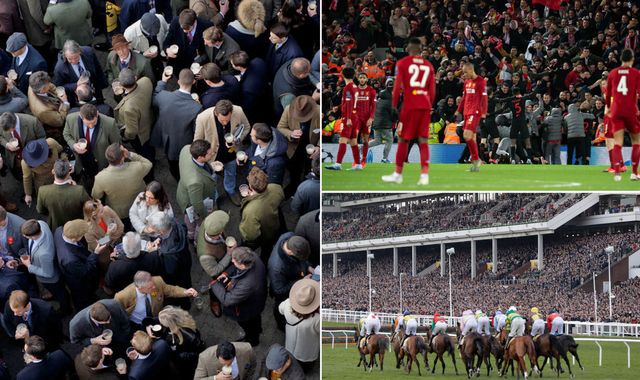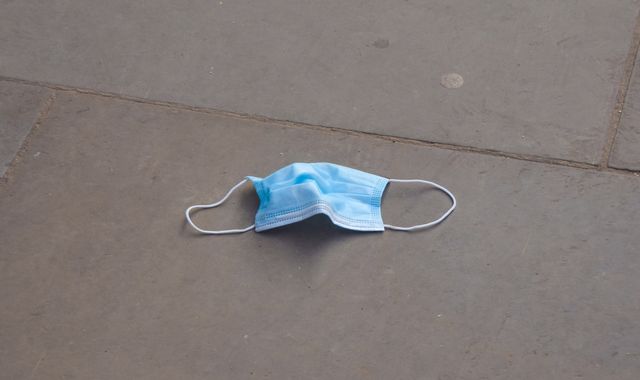Coronavirus: Cheltenham Festival and Liverpool v Atletico Madrid ‘led to spike’ in COVID-19 deaths
Written by News on 27/05/2020
The Cheltenham Festival and Liverpool’s final pre-lockdown match against Atletico Madrid in the Champions League contributed to an increase in coronavirus deaths in the UK, a scientist has said.


Professor Tim Spector, from King’s College London, said the two events – held from 16 to 19 March and on 11 March respectively – had “caused increased suffering and death that wouldn’t otherwise have occurred”.
He said data from an app used to report COVID-19 symptoms showed that Cheltenham and the North West both became “key hotspots” for the coronavirus.
Despite several European countries and cities already being in lockdown by the time the sports fixtures took place, Prime Minister Boris Johnson waited until 23 March to announce his own “stay at home” message in the UK.
More than 251,000 people attended the Cheltenham Festival this year – a drop of nearly 15,000 compared to 2019.
Liverpool’s exit from the last-16 of the Champions League was watched by around 52,000 people inside Anfield, including 3,000 visiting supporters who had travelled from Madrid – where such events had already been suspended.
By the time Mr Johnson ordered the lockdown, the number of coronavirus cases in the UK stood at 6,650 and the number of deaths was 336.
Since then, nearly 37,000 people have died in the UK after contracting COVID-19, the disease caused by coronavirus, and there have been more than 262,000 cases.
Last month, Liverpool City Council announced plans to jointly investigate the spread of the virus in Merseyside, alongside the University of Liverpool and John Moores University, following the match.
Professor Spector, who works in genetic epidemiology research, said: “Two weeks after the Cheltenham Festival and the Liverpool game against Atletico Madrid, we saw the number of people reporting COVID symptoms in the COVID Symptom Study app from those particular areas increase and both areas became key hotspots in the UK.
“This suggests that both events were, in part, a cause for the spread of COVID-19 in those areas.”
Two days before the Atletico match, Culture Secretary Oliver Dowden had rebuffed growing calls for a ban on mass outdoor gatherings.
He told Sky News’ Kay Burley@Breakfast show: “We’ll take evidence from the experts and base our decisions on the facts that we receive from them, particularly the chief medical officer [Professor Chris Whitty].”
“I think in terms of postponing mass sporting events or cancelling them, I think it’s very premature to talk about that sort of thing. We’ll be driven by the evidence, but there is no evidence at the moment to justify such cancellation.”
Data from the Kings College study shows a higher number of cases in Cheltenham and Liverpool compared to their surrounding areas from 22 March to 29 March.
The government has said the events took place within “clear guidance” given at the time.
A spokesman for the Department for Digital, Culture, Media and Sport told Sky News: ”It is our absolute priority to protect people’s health and our advice to the public is based on direct, continuous consultation with scientific and medical experts.
“There are many factors that could influence the number of cases in a particular area, including population density, age, general health, and the position of an area on the pandemic curve.”
:: Listen to the Daily podcast on Apple Podcasts, Google Podcasts, Spotify, Spreaker
It comes after a football match held in Bergamo, northern Italy, days before the first case of the virus being transferred locally was confirmed in the country, was dubbed a “biological bomb” by scientists.
Atalanta’s home Champions League tie against Valencia saw more than 44,000 fans attend the game at the San Siro stadium in Milan on 19 February.
Around a third of the population of Bergamo, in the Lombardy region, went to the game.
Lombardy was the Italian region worst hit by the pandemic, and helped make Italy the most badly affected country in Europe until it was overtaken in cases by Spain and the UK – and also in deaths by the UK.
Nearly 33,000 people have died in Italy after contracting COVID-19, with more than 15,000 deaths in Lombardy.
(c) Sky News 2020: Coronavirus: Cheltenham Festival and Liverpool v Atletico Madrid ‘led to spike’ in COVID-19 deaths






